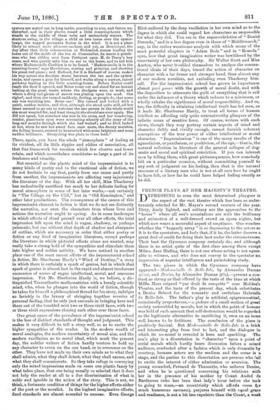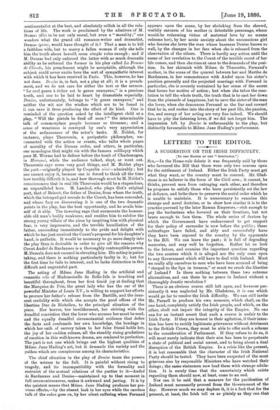FRENCH PLAYS AT HER MAJESTY'S THEATRE.
DEPRESSING to even the most determined playgoer is the aspect of the vast theatre which has been so unfor- tunately selected for Mr. Mayer's second venture of the year. Dirty, dimly lighted, and solitary are the approaches to the " house " where all one's associations are with the brilliancy and animation of a well-dressed crowd on opera nights, but which now wears a mournful aspect of emptiness. One wonders whether the " beggarly array " is so depressing to the actors as it is to the spectators, and feels that, if it be, the latter deserve a great deal of credit for doing their best under the circumstances. Their best the Gymnase company certainly do; and although there is no artist quite of the first class among them except Mdme. Jane Hading, there is not one whose acting is not agree- able to witness, and who does not convey to the spectator an impression of superior intelligence and painstaking study.
The two pieces in which the Gymnase company have appeared—Mademoiselle de Belle•Isle, by Alexandre Damns (pine), and Denise, by Alexandre Damao (fits),—present a con- trast as strong as that offered by the taste of the time at which Mdlle. Mars reigned "par droit de conquilte " over Moliere's Theatre, and the taste of the present day, which substitutes a Denise Brissot for the romantic and credulous Gabrielle de Belle-Isle. The father's play is artificial, epigrammatical, occasionally preposterous,—a picture of a small section of great society untroubled by morals, but in which the point of honour was held of such account that self-destruction would be regarded as the legitimate alternative to sacrificing it, even on an ism) well known to be fictitious. The conclusion of the piece-is positively farcical. But Mademoiselle de Belle-Isle is a brisk and interesting play from first to last, and the dialogue in which its no-moral is revealed is keen and sparkling. The son's play is a dissertation in " character " npon a point of social morals which hardly bears discussion before a mixed audience, conducted after a fashion which is only dramatic by courtesy, because actors are the medium and the scene is a stage, and the parties to this dissertation are persons who fail to excite the interest of either admiration or aversion. The young scoundrel, Fernand de Thauzette, who seduces Denise, and when he is questioned concerning his relations with her in the presence of his mother by Count Andr6 de Bardannes (who has been that lady's lover before she took to going to mass,—an eccentricity which affords room kr ranch humorous sarcasm), perjures himself with equal ,grace and readiness, is not a bit less repulsive than the Count, a weak sentimentalist at the best, and absolutely selfish in all the rela- tions of life. The work is proclaimed by the admirers of M. Dumas fits) to be not only moral, but even a " morality ;" one wonders what the grand old romance-writer and dramatist, Dumas (pere), would have thought of it ? That a man is to kill a faithless wife, but to marry a fallen woman if only she tells him the truth about herself, seem simple rules enough ; and if M. Dumas had only enforced the latter with as much dramatic ability as he enforced the former in his play called La Femme de Claude, his preachment might be acceptable, although the subject could never excite here the sort of sympathetic interest with which it has been received in Paris. This, however, he has not done. Denise is, in fact, not a play at all; it is a preach- ment, and we do not care for either the text or the sermon. "Le seul genre it &Titer est le genre ennuyeux," is a precious truth, and one to be laid to heart by dramatists especially. Denise, unfortunately, belongs to " le genre ennuyeux," and neither the wit nor the wisdom which are to be found in it can save it from producing the effect of its kind. One is reminded of the question asked by the intelligent child at a play, "Will the pistols be fired off soon ? " the interminable talk of commonplace people becomes so tiresome ; and a sense of weariness is conveyed by one's very appreciation of the arduousness of the actor's tasks. M. Noblet, for instance, plays Thouvenin, a peripatetic philosopher, un- connected with the action or events, who talks whole pages of morality of the Dumas order, and utters, in particular, one monologue that might vie with the famous soliloquy which poor M. Worms had to deliver before the tomb of Charlemagne, in Hernani, while the audience talked, slept, or went out. Thonvenin says some very good things, and M. Noblet plays the part—originally played by Coquelin aina—admirably ; but one cannot enjoy it, because one is forced to think all the time how terribly difficult it is, and how thorough must be M. Noblet's consciousness that in real life Thouvenin would be a stupendous, an unparalleled bore. M. Landrol, who plays Got's original part, that of Brissot, the father of Denise, from whom the truth, which the betrayed girl reveals to the Count, has been concealed, and whose fury on discovering it is one of the two dramatic points in the play, has the best opportunity, and he avails him- self of it ably. The towering rage that surmounts the honour- able old man's bodily weakness, and enables him to subdue the strong young villain of the piece by inspiring him with physical fear, is very impressive, and the terrible humiliation of the father, succeeding immediately to the pride and delight with which he has just received the Count's proposal for his daughter's hand, is pathetic. It would be necessary to go more deeply into the play than is desirable in order to give all the reasons why Count Andre de Bardannes is a thoroughly contemptible person. M. Damala does not succeed in elevating him. His acting is pains- taking, and there is nothing particularly faulty in it ; but for the first time he fails to interest, and he lacks distinction in this difficult and ungrateful part.
The acting of Mdme. Jane Hading in the artificial and romantic rale of Mademoiselle de Belle-Isle is touching and beautiful throughout, from her first timid joy at finding that the Marquise de Prie, the great lady who has the ear of the powerful Minister of Louis XV., is willing to support her efforts to procure her father's release from the Bastille, and the inno- cent credulity with which she accepts the good offices of the libertine Due de Richelieu, to the principal situation of the piece. Her horror, her bewilderment, her striving with the dreadful conviction that the lover who accuses her must be mad, and the equally dreadful circumstantial evidence that defies the facts and confounds her own knowledge, the bondage in which her oath of secrecy taken to her false friend holds her, the joy of her sudden release, all the steadily rising gradations of emotion in this well-known drama, are rendered to perfection. The part is not one which brings out the highest qualities of Mdme. Jane Hading's art, but it demands the variety and the pathos which are conspicuous among its characteristics.
The chief situation in the play of Denise taxes the powers of the actress to the full. It is painful without rising to tragedy, and its incompatibility with the formality and restraint of the mutual relations of the parties to it—Andre de Bardannes and Denise—maintained up to that moment in full ceremoniousnesss, makes it awkward and jarring. It is by the quietest means that Mdme. Jane Hading produces her pre- vious effects,—by the absent look in her eyes while the careless talk of the salon goes on, by her silent suffering when Fernand
appears upon the scene, by her shrinking from the shrewd, worldly sarcasm of his mother (a detestable personage, whose would-be redeeming virtue of maternal love by no means redeems her), by her acute anxiety about the unconscious girl who fancies she loves the man whose baseness Denise knows so well, by the changes in her face when she is released from the observation of the others. There is hardly any action until the scene of her revelation to the Count of the terrible secret of her life comes, and then she rises at once to the demands of the posi- tion. In her skirmish with Mdme. de Thauzette, Fernand's mother, in the scene of the quarrel between her and Marthe de Bardannes, in her remonstrance with Andre upon his sister's position generally and the projected marriage with Fernand in particular, she is severely restrained by her sense of the secret that forms her motive of action ; but when she takes the reso- lution to tell the whole truth, the truth that is to cast her down from the pinnacle of happiness, but to save the sister of the man she loves, when she denounces Fernand as the liar and coward that he is, and rushes into the story of her past life, the passion, fire, and energy of her acting are very fine indeed. We should have to pity the listening lover, if we did not forget him. The impression left by Denise is unfavourable to the play, but distinctly favourable to Mdme. Jane Hading's performance.





































 Previous page
Previous page